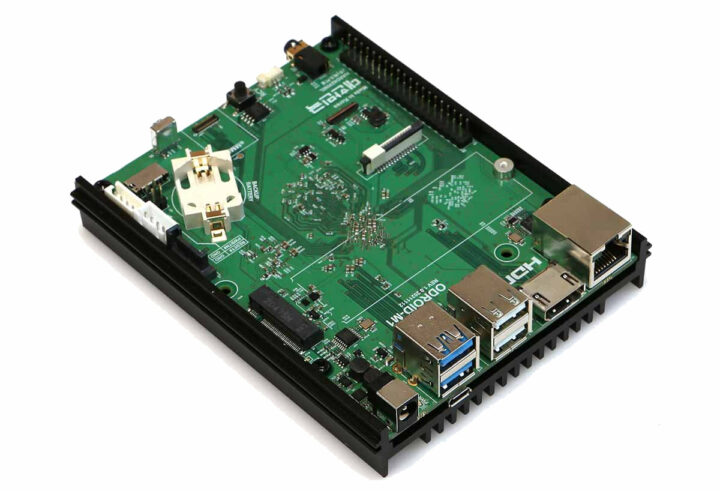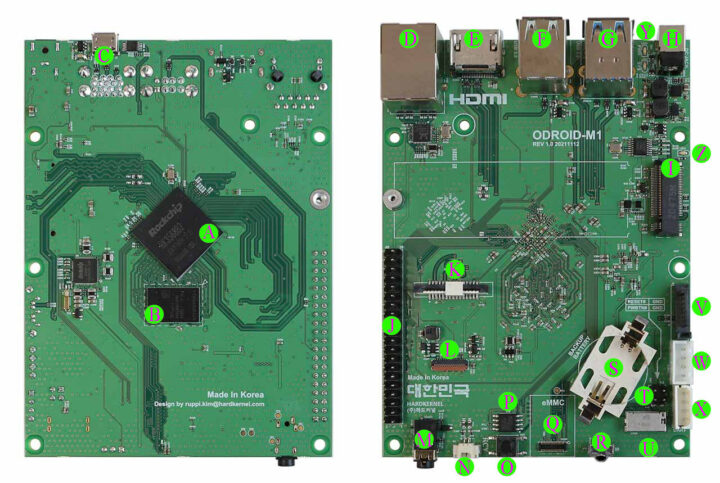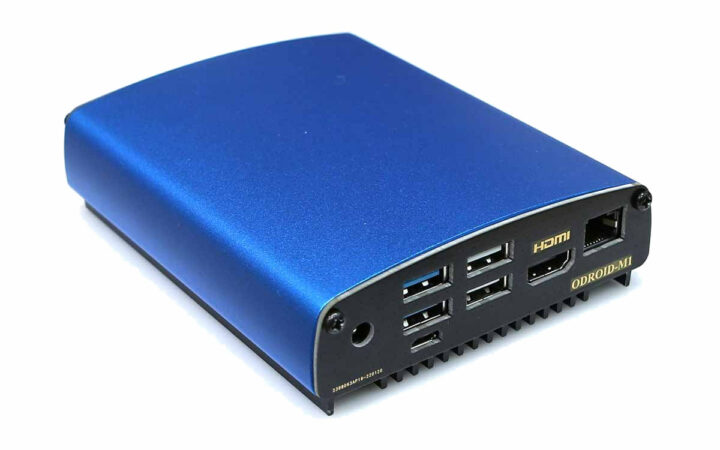It’s been a while since we have seen new hardware from Hardkernel, but the Korean company has just launched the ODROID-M1 SBC powered by Rockchip RK3568 with up to 8GB RAM.
The single board computer is cooled with a large heatsink placed underneath, supports SATA and NVMe storage, offers HDMI and MIPI DSI video output, Gigabit Ethernet networking, as well as two USB 3.0, two USB 2.0 ports, an RTC backup battery, and a 40-pin GPIO header.
ODROID-M1 specifications:
- SoC – Rockchip RK3568B2 quad-core Cortex-A55 processor @ up to 2.0 GHz with Arm Mali-G52 MP2 GPU, 0.8 TOPS AI accelerator
- System Memory – 4GB or 8GB LPDDR4 RAM
- Storage
- 16MB SPI flash preinstalled with Petitboot
- MicroSD card socket
- eMMC module socket
- Native SATA 3.0 port + SATA power (5V only) tested up to around 500 MB/s
- M.2 NVMe M-Key socket (2-lane PCIe 3.0) for M.2 SSDs tested up to around 1600MB/sec (or four times faster than the same SSD installed on a system based on Raspberry Pi CM4)
- Video Output
- 1x HDMI 2.0 port up to 4Kp60 with HDR, EDID
- 1x 4-lane MIPI DSI connector tested with 1280×800 display
- Camera I/F – 1x 2-lame MIPI CSI connector
- Audio – 3.5mm headphone jack, mono speaker output (1.3W at 8Ω load)
- Networking – Gigabit Ethernet RJ45 port via Realtek RTL8211F (Ethernet transceiver)
- USB
- 2x USB 3.0 ports (or 1 x USB 3.0 host + 1 x USB 2.0 OTG port)
- 2x USB 2.0 ports
- 1x Micro USB device port
- Expansion – 40-pin GPIO header
- Debugging – UART header for serial console
- Misc – Power button, SPI Boot Select switch, IR receiver, RTC battery holder, jumper, 2x system LEDs, M.2 LED
- Power Supply – 7.5V to 15.5V via DC power jack (12V/2A adapter recommended)
- Power consumption
- Suspend – 0.06 Watt
- Idle – 1.3 Watt
- Heavy load – 4.5Watts
- Dimensions – Board: 122 x 90 x 16mm; heatsink: 123 x 100 x 19mm
- Weight – 253 grams including heatsink
That RK3568B2 is a slightly modified version of the RK3568 designed to overcome the IC supply shortage. The previous RK3568 metal-can type packaging lead time is much longer than the more common plastic package of the RK3568B2 according to Hardkernel.
Hardkernel says the CPU & GPU performance is similar to the Amlogic S905X3 based ODROID-C4 SBC. An stress test increased temperature up to a little over 50°C in a room with a 35°C ambient temperature. The company will provide Ubuntu 20.04 LTS & 22.04 LTS images and Android 11 images based on Linux 4.19. But somehow the Ubuntu images will come with Linux 4.19.219, while Android will be based on the older Linux 4.19.193 and support HDMI and MIPI-DSI at the same time. Support for the Panfrost open-source GPU driver and mainline Linux is expected in the next few months.

If you like your boards to be protected by an enclosure, Hardkernel also provides a metal case kit in which the ODROID-M1 SBC together with its heatsink can be inserted via a “sliding slot”, and the company says the front and rear side covers are made with gold plated PCBs.
ODROID-M1 is available now for $90 with 8GB RAM, but the $70 variant with 4GB RAM is currently out of stock. Rockchip guarantees supply for the RK3568B2 for the next 15 years, and Hardkernel expects to be able to supply the ODROID-M1 boards to B2B customers until the year 2036 or beyond.

Jean-Luc started CNX Software in 2010 as a part-time endeavor, before quitting his job as a software engineering manager, and starting to write daily news, and reviews full time later in 2011.
Support CNX Software! Donate via cryptocurrencies, become a Patron on Patreon, or purchase goods on Amazon or Aliexpress








The M.2 slot is 2280, not 2242.
That’s a handy bit of information, but I don’t see where the article says anything about the M.2 slot length.
It did when the article went up, but it’s been fixed.
You mean completely removed?
Hardkernel provided wrong information, Jean-Luc then wrote about ‘M.2 42 SSDs’ and adjusted this later. If he now edits the input voltage range (“7.5V~15.5V”) everything is in sync again.
Not bad, but except for the M2 there is not much advantage against the many S905* boards that go for like 40€.
The cheapest S905x would be the C4, which goes for $54 these days. If you import that to Europe you have to pay import fees and VAT on top of that, so they’re no longer as cheap as €40.
Also, the M.2 and SATA connectivity is the main difference. It’s priced similarly to the HC4, which has two SATA ports but no M.2. $70 Seems like a fair price to me, compared to those other boards.
> The cheapest S905x would be the C4
He spoke about “S905* boards” so if someone is rather stupid (taking list prices in some webshops seriously forgetting about all the additional costs) then something like S905Y2 equipped Radxa Zero might be the benchmark (starting at 16 bucks).
Of course the whole comparison is stupid once you start to think about use cases and are not just the average retro gamer. Everything Amlogic sucks really hard if it’s about I/O.
Or if you want to use the hardware H264 encoder (or even the decoder via ffmpeg)
Going off Odroid.co.UK The pre order, 8G M1+12v power supply, is £148 inc Vat.
They ship to some EU countries for €6.99
Plus import taxes ..
Great job, really! And quite reasonable price.
8GB memory + NVMe PCIe Gen 3 x2 + SATA III + eMMC with ARM < $100 = respect.
I ordered mine on Ameridroid with eMMC 64GB, Camera, SATA mount, USD UART kit for less than $200 (wo tax and shipping)
A real whiff of fresh air compared to all these boards with no accessories > $200.
Congratulations to the HK engineering team.
The likes of the C4 will start to show their age with the new SOC’s being released, so introducing something that is essentially a match seems a backward step.
The M.2 socket is the only real positive but Hardkernel again decide to leave WiFi and Bluetooth off the board, which I think is a big mistake.
The RK3568 will be a certified antique by 2036, so I’m not so sure that this promise will mean anything useful. A 5 year guarantee, maybe.
And personally I would never touch a product from a manufacturer, who’s default warranty is closer to that of a pint of milk. It just doesn’t inspire purchasing confidence if the manufacturer is unwilling to show the same in their own product.
Cortex-A55 is the final in-order core to support 32bit ARM.
Yes this thing will be a relic within 3 years, let alone 15, with the release of A510 SoCs.
But for certain use cases, perhaps 32bit longevity makes sense.
Hahahaha sure, keep purchasing rpis, if you find some at msrp.
It’s more for B2B but they are selling it to the public as well, that’s why it may not make sense to you.
As far as the warranty, I have about 15 Odroid devices and not a single failure over the 7+ years I’ve been using them.
> I have about 15 Odroid devices and not a single failure over the 7+ years I’ve been using them.
I second that, their products are of very high quality.
Plus the fact that the HK forums are also of high quality. In addition to other quite competent users answering questions, you can even communicate with the HK people who actually designed the thing.
But standard practice tends to be 12 months to give peace of mind, so by average practice, it is not a smart business decision when selling to the public and the Hardkernel forums had multiple complaints about the original N2 failing early on but outside of their warranty period, which they were reluctant to accept any responsibility for too.
Don’t get me wrong I do wish their warranty was longer I was just saying I’ve extensively used their devices without issue.
> standard practice tends to be 12 months
If you want ‘standard’ warranty go visit Hardkernel’s site, search for their distributors and simply buy there. Then you also get more realistic prices which means in my country multiplying HK’s $ price tag with ~1.4 to get retail price in € (VAT/taxes and warranty handling then included, shipping adds extra).
My countries official stockist does increase this to a whopping 3 months.
Ditto.
Well, the A53 is 10-years old and continues to sell like crazy, so I think the A55 can replace it an keep a good longevity. And contrary to what you’re saying, I think it’s a smart choice *not* to integrate WiFi nor Bluetooth in a board that is supposed to last, since every 3 years you have to replace all these devices because they do not support the new emerging standards once the previous ones are declared totally cracked. In 5-10 years you’ll just have to buy a new USB-wifi adapter to stay secure and that will be all.
In respect to BT and WiFi, it is inevitable that new standards will come along but as so many devices do come with both as standard then it does essentially go against an industry standard and those manufacturers do not seem to share the same concern.
WiFi and Bluetooth adds huge extra certification costs, so it’s not so strange they leave it off a development board.
I have purchased many cheap £20 boxes over the years that have had both technologies built in and even external adapters can be super cheap, so I don’t see this as being a huge cost element.
Consumers aren’t the only buyers. In industrial, 15 year old systems are no big deal. Just look at this:
https://www.digikey.com/en/products/filter/embedded-microprocessors/694?s=N4IgjCBcoLQdIDGUBmBDANgZwKYBoQB7KAbRACYA2AThAF0BfBg80kALQA4AGehoA
Absolutely true that near 50 years old Z80 series is still used in various embedded applications. 😮
Whilst I can see that at the super low end, chips have been used for many years for very basic operations, I’m not so sure that this particular Rockchip SOC is in the same category.
I wonder how many RK3066 SOC’s are in demand today.
Does the packaging cause any other differences?
” The previous RK3568 metal-can type packaging lead time is much longer than the more common plastic package of the RK3568B2 “
I can’t imagine it does but that is a good question.
I’ve had an accidental joke on an RK3288 (metal case). After trying to remove a heatsink that was glued with silicon paste, I ended up lifting the metal case with the heatsink, leaving just a flat plastic package underneath. The metal part was essentially a riser probably expected to collect the heat from all over the plastic surface and spread it to a metal device. But I couldn’t see the silicon chip nor anything sensitive (and the device continued to work flawlessly anyway).
I was thinking it may be a heat spreader or some sort of shielding but since I don’t really know I couldn’t comment.
That’s interesting.
I’ve got 2x Odroid N2’s and 2x Station PC’s. Somehow this does not seem that attractive without the Dual GBe of the Station PC’s.
Is there a good read on why only older kernels are available for these SBC’s?
> only older kernels are available for these SBC’s?
Easy: since that’s what Hardkernel got from Rockchip. A BSP based on an ancient 4.19 kernel.
Rockchip (and many others) design their SoCs for the Android market. This implies they must be certifiable by Google to meet the license terms for certain applications (app store, maps, etc.). Since SoC production takes many years from design to availability, a specific version of Android is targeted. Each version of Android requires a specific kernel version that has long term support (LTS).
Linux, unlike other modern operating systems, does not have a stable driver API. Drivers can and do fail to work with each new kernel version. This makes writing drivers a “moving target” and reinforces the desire to target a specific kernel version.
Further compounding the issue in this instance is COVID. The RK3568 release was delayed.
The above three factors combine to form a “perfect storm” resulting in the manufacturer provided 4.19 kernel.
4.19 was a supported kernel for Android 10-12.
Indications are that Android 13 will bump the bare minimum version to 5.4/5.10 LTS, requiring rockchip to forward-port their patchsets to a newer BSP if device makers want to target that version of Android into the future.
> requiring rockchip to forward-port their patchsets to a newer BSP if device makers want to target that version of Android into the future.
Serious question: has this ever happened with any of Rockchip’s Android SoCs?
When looking at places selling crappy TV boxes, RK3328 is Android 9, RK3399 is Android 7 and RK3288 is still Android 4.4.
I don’t know of any PRC company that ever did this and a lot of other, bigger players are in the same boat, with the exception of companies who make chips for phones.
I hope they release a bracket / case that allows you to mount a 2.5″ hard drive.
Odroid always shows specs wrongly regarding the gpus. It’s a mali G52 with 2 EE. The N2 has a G52 mp2 with 3EE each. G52 can be very customizable, with 2 or 3 EE per “core”
Rk3568: Mali g52 mp1 2EE *
And the N2 is mali g52 mp2 3EE each**
Interesting insights. They might just copy SoC vendors’ wrong marketing materials.
How about Odroid C4 S905X3 mali g31?
Is it mp1 x 2EE ? or mp2 x 1EE? or mp2 x 2EE?
From googling it looks like it’s mp2 x 4EE. https://fave.co/373luIE
This is so huge. It is bigger then N2 🙁
Interesting, RK3588 is released and they decide to go with the RK3568, which is even slower than the N2+.
We lose CPU horsepower in exchange of M2 & SATA connectors. Well, it’s depending on the needs of the person I suppose.
All the RK3588 boards we’ve seen yet go for $200+, I think this is aimed at a different market segment.
The ROCK5 Model B is currently being offered for as little as $144.95 USD
> We lose CPU horsepower in exchange of M2 & SATA connectors
And those who you refer to as ‘we’ get also the 1st time in Hardkernel’s history USB3 ports that are not behind an internal USB hub (RK3399 based N1 that never got released being the other exception). As you said it’s always about use cases and rich I/O is where these Rockchip SoCs shine especially compared to Amlogic.
Yeah, this seems to be NAS focused at the very least. But that makes me wonder why they didn’t add either 2 nvme or 2 SATA ports to be able to RAID instead one of each.
maybe it will get something like a pcie to 4x sata extender
There’s a standard M.2 Gen3 x2 slot perfectly suited for any M.2 card with an JMB585 or ASM1166 (both also Gen3 x2) to provide 5 or 6 SATA ports.
But IIRC RK3568 can cope with SATA port multipliers so if it’s about ‘cold storage’ by using something like an JMB575 five pieces of spinning rust can also be attached to the SATA port.
> 2 nvme or 2 SATA ports to be able to RAID
Maybe they decided against since RAID-1 especially with 2 identical SSDs is such a terrible idea? On the other hand consumers/hobbyists love to adopt now abandoned server concepts popular decades ago.
Keep in mind that asides PCIe Gen3 and RGMII there are only 3 SerDes lanes to provide SATA, USB3 and/or PCIe Gen2: https://eji4evk5kxx.exactdn.com/wp-content/uploads/2020/12/RK3568-multiplexed-sata-usb-3.0-pcie.jpg
the board is just perfect,
but the CANBUS is not use in this board….
I WANT canbus for my application…
but RK3568 manage CANBUS…
🙁
CAN appears to be available based on this kernel commit:
https://github.com/hardkernel/linux/commit/0fb1bcb2c29d262b0cbd03d3ce44504e1fafb2de
If I read the pin config correctly, it is exposed on pin 27 and 28 on the GPIO connector.
Now they just need to make a case that can accomodate 4-6 hard drives and power supply that can provide 7-10 watts to each drive.
I hope for sustainability reasons ‘they’ send you to your local scrap yard to repurpose/refurbish an old PC case you get there for free. If it’s about the NAS use case the enclose can be ugly as hell since the NA in NAS stands for network attached so you can hide the whole thing anyway.
One of the Hardkernel guys even provides a 3D printed HDD slot adapter for M1: https://www.thingiverse.com/thing:5336924